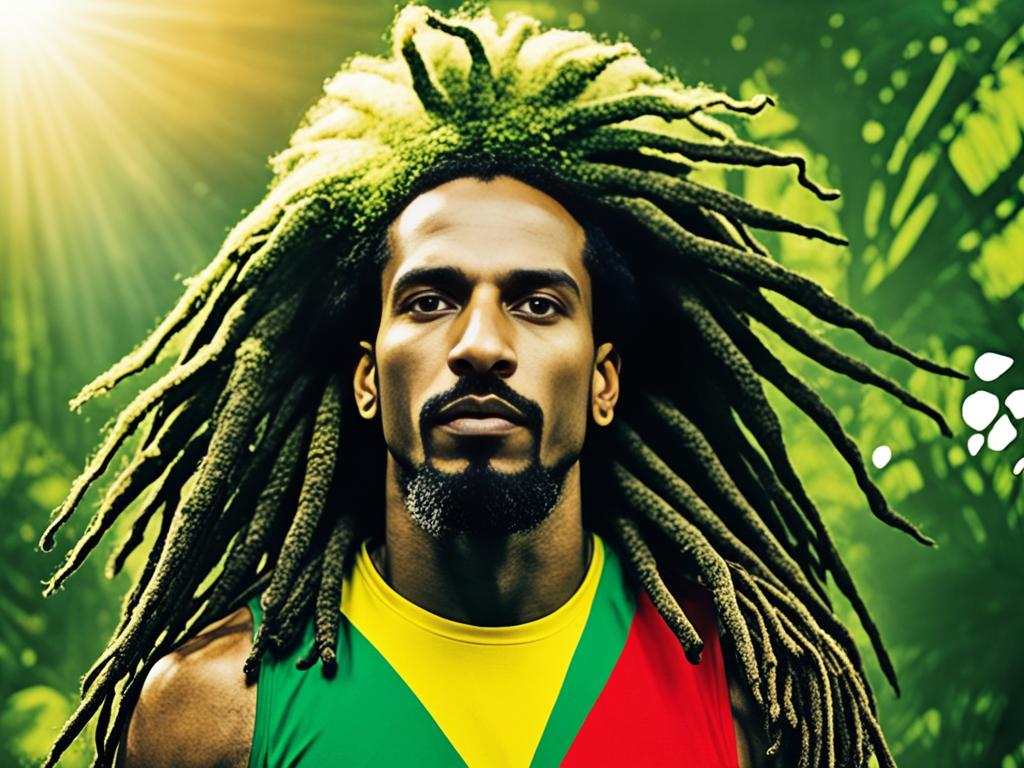Welcome to the world of Rastafarianism, a vibrant and profound movement that encompasses philosophy, acts of resistance, and deep spirituality. Rooted in the rich cultural heritage of Jamaica, Rastafarianism has captivated the hearts and minds of millions across the globe.
At its core, Rastafarianism is a philosophy that embraces social justice, equality, and the empowerment of marginalized communities. The principles of resistance against oppression are deeply ingrained in the fabric of this movement, as Rastafarians strive to challenge and dismantle systems of inequality.
One of the most distinctive aspects of Rastafarianism is its spiritual foundation. Rastafarians believe in the divinity of Emperor Haile Selassie I of Ethiopia, whom they see as the Messiah. Their spirituality is deeply rooted in the teachings of the Bible, with an emphasis on Old Testament figures such as King Solomon and the Twelve Tribes of Israel.
Throughout this article, we will explore the rich history and evolution of Rastafarian thought, delve into its social and political ideals, and uncover the symbolism behind two integral aspects of the movement – dreadlocks and the Rastafarian diet. We will also dive into the profound influence of Rastafarianism on music and art, including its close association with the reggae genre and iconic musicians like Bob Marley.
Get ready to embark on a journey that will immerse you in the philosophy, resistance, and spirituality of Rastafarianism. Let’s explore the roots and evolution of this extraordinary movement and discover the impact it has had on society and culture.
Key Takeaways:
- Rastafarianism encompasses philosophy, resistance, and deep spirituality.
- It is rooted in Jamaica and has a rich cultural heritage.
- Rastafarians advocate for social justice, equality, and liberation from oppression.
- The movement is deeply spiritual, with a focus on Emperor Haile Selassie I as the divine Messiah.
- Rastafarianism has had a profound influence on music, particularly reggae, and artistic expression.
The Roots and Evolution of Rastafarian Thought
In order to understand the essence of Rastafarianism, it is crucial to explore its roots and evolution. This vibrant spiritual and social movement emerged in the early 20th century in Jamaica, a country with a rich cultural heritage. Rastafarian thought was deeply influenced by various factors including Ethiopianism, black liberation movements, and the search for spiritual identity.
The African diaspora plays a significant role in the formation of Rastafarianism as individuals of African descent sought to connect with their ancestral roots and challenge the oppressive forces that had subjugated them. The movement gained momentum after the Harlem Renaissance, a cultural and intellectual movement that celebrated African heritage and brought attention to the struggles faced by people of African descent around the world.
One of the key figures who shaped Rastafarian thought and elevated it to a global stage was Marcus Garvey, a Jamaican political leader and entrepreneur. Garvey’s beliefs in black self-empowerment, African pride, and the repatriation of Africans to their ancestral land resonated deeply with the emerging Rastafarian movement.
The philosophy of Rastafarianism evolved to incorporate various beliefs and practices, drawing inspiration from Ethiopianism, a movement that highlighted Ethiopia’s historic role as a symbol of African pride and resistance against colonialism. The crowning of Emperor Haile Selassie I of Ethiopia further solidified the reverence Rastafarians held for him, as they believed Selassie to be the messiah and an embodiment of the divine.
| Key Influences | Effect on Rastafarian Thought |
|---|---|
| Ethiopianism | Embraced Ethiopia as the spiritual homeland and regarded Emperor Haile Selassie I as a figure of great importance. |
| Black Liberation Movements | Advocated for the empowerment and liberation of black people, challenging societal norms and systems of oppression. |
| Reggae Music | Became a powerful medium of expressing Rastafarian beliefs, spreading their message of unity, love, and social justice across the globe. |
The evolution of Rastafarian thought is a testament to its dynamic nature and its ability to adapt to changing times and cultural influences. From its humble beginnings in Jamaica, Rastafarianism has grown into a global movement, captivating the hearts and minds of individuals from diverse backgrounds who seek spirituality, justice, and a connection to their African roots.
Rastafarianism and Its Social and Political Ideals
Rastafarianism is not merely a spiritual belief system; it is also deeply rooted in social and political ideals. At its core, Rastafarianism promotes principles of equality, community, and resistance against oppression.
One of the fundamental social ideals of Rastafarianism is the belief in the equality of all individuals. Rastafarians reject systems of discrimination and injustice, emphasizing the importance of treating every person with respect and dignity. In the Rastafarian community, social hierarchies are dismantled, and everyone is considered equal in the eyes of Jah, their supreme deity.
Another key aspect of Rastafarianism is its emphasis on community. Rastafarians believe in the power of collective strength and unity. They view themselves as part of a larger global family, seeking to build harmonious communities based on cooperation, shared resources, and mutual support. Through their tight-knit communities, Rastafarians find solace and gain strength in their shared beliefs and practices, fostering a sense of belonging and purpose.
Rastafarianism teaches the importance of coming together to uplift one another, establishing social structures that promote fairness and inclusivity.
Rastafarians have a long history of advocating for social justice and influencing political movements. Their commitment to equality and resistance against oppression has led them to actively campaign against racial discrimination and other social injustices. They have played a significant role in challenging power structures and advocating for political change, both in Jamaica and globally.
From Marcus Garvey’s vision of Pan-Africanism to Bob Marley’s powerful music, Rastafarianism has had a profound impact on political thought. Rastafarians have used their platform to raise awareness about social and political issues, challenging the status quo and promoting peaceful resistance. Their influence can be seen in various social justice movements, inspiring generations to stand up for their rights and fight against systemic oppression.
Rastafarianism and Pan-Africanism
Rastafarianism has made significant contributions to the ideals of Pan-Africanism, which promotes unity and empowerment among people of African descent. Rastafarians uphold Pan-African values by celebrating African culture and history, advocating for African sovereignty, and supporting the African diaspora globally.
| Rastafarianism | Pan-Africanism |
|---|---|
| Embraces African spirituality and culture as intrinsic to its beliefs | Encourages a connection to African roots and heritage |
| Advocates against racial inequality and discrimination | Promotes solidarity and empowerment among people of African descent |
| Rejects Western hegemony and seeks African self-determination | Seeks political and economic independence for African nations |
Rastafarianism and Pan-Africanism share a common goal of creating a more just and equitable world, both socially and politically. Through their combined efforts, Rastafarians and Pan-Africanists continue to inspire movements for social change and advocate for the rights and well-being of marginalized communities.
The Symbolism of Dreadlocks and the Rastafarian Diet
Aspects such as dreadlocks and diet hold deep symbolism within Rastafarianism. Let’s explore their significance and the connection they have to the Rastafarian way of life.
Spiritual Significance of Dreadlocks
Dreadlocks, a distinctive hairstyle associated with Rastafarianism, hold profound spiritual meaning. They symbolize the Rastafarian’s commitment to adhering to their natural state, embracing their African heritage, and practice of rejecting societal norms and materialistic ideals.
For Rastafarians, dreadlocks are not merely a fashion statement. They convey a spiritual journey of self-discovery and spiritual awakening. The process of growing and maintaining dreadlocks is seen as a conscious decision to honor and respect one’s journey towards spiritual enlightenment.
“Dreadlocks is the warrior’s crown, a symbol of strength, spirituality, and rebellion against the oppressive systems that seek to strip us of our identity. It is a symbol of our resistance and resilience.” – Ras Tafari, Rastafarian philosopher
The Rastafarian Diet: A Natural and Sacred Way of Nourishment
The Rastafarian diet is a fundamental component of the Rastafarian way of life. It is based on the belief that the body is a temple, and what we consume directly affects our spiritual and physical well-being.
Rooted in the principles of natural living, Rastafarians follow a diet that primarily consists of fresh fruits, vegetables, and whole grains. This dietary choice aligns with their reverence for the Earth, emphasizing the consumption of organic and unprocessed foods that harmonize with nature.
Additionally, Rastafarians adhere to a strict vegetarian or vegan lifestyle, often avoiding the consumption of meat, dairy products, and processed foods. This choice is motivated by their commitment to non-violence, respect for all living beings, and the belief that a plant-based diet promotes spiritual purity.
The Connection Between Dreadlocks and Diet
The connection between dreadlocks and diet in Rastafarianism lies in their shared focus on natural living and spiritual devotion. Both dreadlocks and the Rastafarian diet serve as visible markers of a Rastafarian’s commitment to their spiritual path and the principles they hold dear.
Together, dreadlocks and the Rastafarian diet are powerful symbols of Rastafarian identity, unity, and resistance against societal norms. They embody the collective efforts of Rastafarians to reconnect with their African roots, live in harmony with nature, and pursue spiritual enlightenment.
As we continue to explore the facets of Rastafarianism, we turn our attention to the influence of this spiritual movement in music and art.
Rastafarianism in Music and Art
One of the most notable aspects of Rastafarianism is its significant influence on music and art. The rhythmic beats of reggae music and the vibrant expressions of Rastafarian-inspired art have captivated audiences worldwide.
The Rhythm of Reggae
Reggae music, synonymous with Rastafarianism, carries the essence of this spiritual movement. Known for its distinctive bass lines, offbeat rhythms, and socially conscious lyrics, reggae embodies the spirit of resistance and the pursuit of equality.
Bob Marley, an iconic figure in both the music industry and Rastafarianism, rose to fame as a reggae musician who used his platform to spread messages of love, unity, and social justice. His songs, such as “One Love” and “Redemption Song,” became anthems for the Rastafarian movement and continue to resonate with audiences to this day.
A Canvas of Inspiration
Rastafarianism has also deeply influenced the world of art, inspiring artists to express their beliefs and spirituality through their creations. From vibrant paintings to intricate sculptures, Rastafarian-inspired art showcases the colors, symbols, and themes of this rich cultural movement.
“Art is the most high… the highest form of meditation…” – Ras Dizzy B
Artists like Ras Dizzy B, Leonard Daley, and Everald Brown have played instrumental roles in incorporating Rastafarianism into their artwork. Their pieces often depict scenes from Jamaican life, nature, and the Rastafarian faith, offering viewers a glimpse into the rich tapestry of beliefs and experiences that underpin this vibrant culture.
A Tapestry of Culture
The melding of Rastafarianism with music and art creates a tapestry of culture and spirituality. It not only serves as a means of expressing the Rasta philosophy but also raises awareness and spreads the message of social justice and equality to a global audience.
Rastafarian-inspired music and art continue to inspire, uplift, and educate people from all walks of life, fostering a greater appreciation for the diversity and power of this dynamic movement. Through their creations, musicians and artists continue to carry the flame of Rastafarianism, ensuring that its spirit lives on for generations to come.
Conclusion
In conclusion, Rastafarianism is a vibrant and powerful movement that encompasses philosophy, acts of resistance, and deep spirituality. Through its principles of equality and community, Rastafarianism has influenced social and political ideals, advocating for social justice and inspiring political movements. The symbolism of dreadlocks and the emphasis on a natural diet further reinforce the significance of Rastafarianism as a holistic way of life.
Moreover, the impact of Rastafarianism extends beyond its cultural roots in Jamaica. Through reggae music and art, Rastafarianism has found a global platform, captivating hearts and minds with its messages of love, empowerment, and unity. Artists like Bob Marley have become icons of this movement, spreading its values of peace and harmony to audiences worldwide.
In a world that often prioritizes materialism and division, Rastafarianism offers a valuable alternative, emphasizing the importance of compassion, connection, and spiritual growth. With its rich history and enduring influence, Rastafarianism continues to inspire individuals and communities to embrace a way of life that is rooted in love, resilience, and the pursuit of justice.







